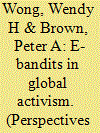|
|
|
Sort Order |
|
|
|
Items / Page
|
|
|
|
|
|
|
| Srl | Item |
| 1 |
ID:
126320


|
|
|
|
|
| Publication |
2013.
|
| Summary/Abstract |
In recent years, WikiLeaks and Anonymous have made headlines distributing confidential information, defacing websites, and generating protest around political issues. Although many have dismissed these actors as terrorists, criminals, and troublemakers, we argue that such actors are emblematic of a new kind of political actor: extraordinary bandits (e-bandits) that engage in the politics of no one via anonymizing Internet technologies. Building on Hobsbawm's idea of the social bandit, we show how these actors fundamentally change the terms of global activism. First, as political actors, e-bandits are akin to Robin Hood, resisting the powers that be who threaten the desire to keep the Internet free, not through lobbying legislators, but by "taking" what has been deemed off limits. Second, e-banditry forces us to think about how technology changes "ordinary" transnational activism. Iconic images of street protests and massive marches often underlie the way we as scholars think about social movements and citizen action; they are ordinary ways we expect non-state actors to behave when they demand political change. E-bandits force us to understand political protest as virtual missives and actions, activity that leaves no physical traces but that has real-world consequences, as when home phone numbers and addresses of public officials are released. Finally, e-banditry is relatively open in terms of who participates, which contributes to the growing sense that activism has outgrown organizations as the way by which individuals connect. We illustrate our theory with the actions of two e-bandits, Anonymous and WikiLeaks.
|
|
|
|
|
|
|
|
|
|
|
|
|
|
|
|
| 2 |
ID:
116341


|
|
|
|
|
| Publication |
2012.
|
| Summary/Abstract |
How does the way in which a group organizes change the lethality of the group's attacks? In this article, we argue that groups organized vertically as hierarchies are likely to conduct more lethal attacks. We build our argument around three advantages inherent to centralized structures: functional differentiation, clear command and control structures, and accountability. We argue that each of these characteristics positively impacts an organization's ability to deliver an effective lethal blow. To test our argument, we use a mixed method approach, drawing on empirical evidence and support from a time-series case study. Our large-N analysis examines the trends in more than 19,000 attacks. In this test we develop a novel proxy measure for hierarchy based on a group's bases of operation and non-violent activities. To complement the empirical work, we examine the history of Euskadi Ta Askatasuna (ETA), the Basque separatist group. Over several decades of violent operations, this group's structure has changed dramatically. We analyze how these shifts impacted ETA's ability to maximize the effectiveness and damage of their attacks. In both the case study and large-N analysis, the more hierarchically organized the group, the more easily the group can orchestrate lethal attacks.
|
|
|
|
|
|
|
|
|
|
|
|
|
|
|
|
|
|
|
|
|